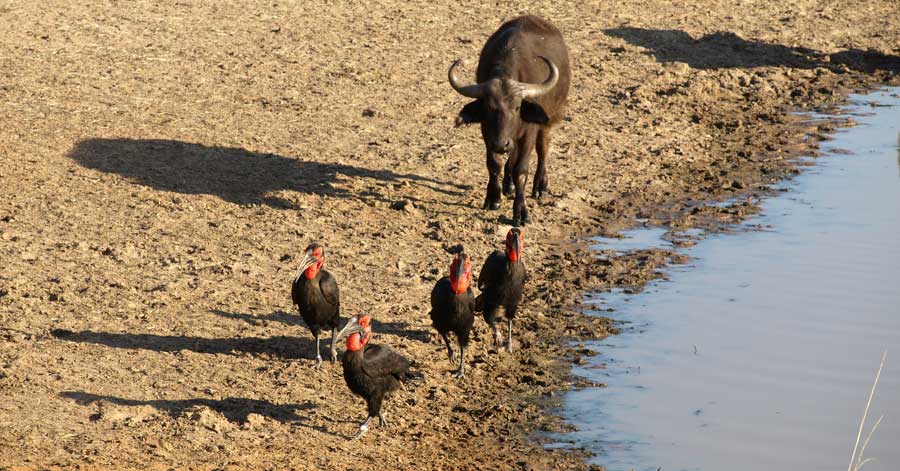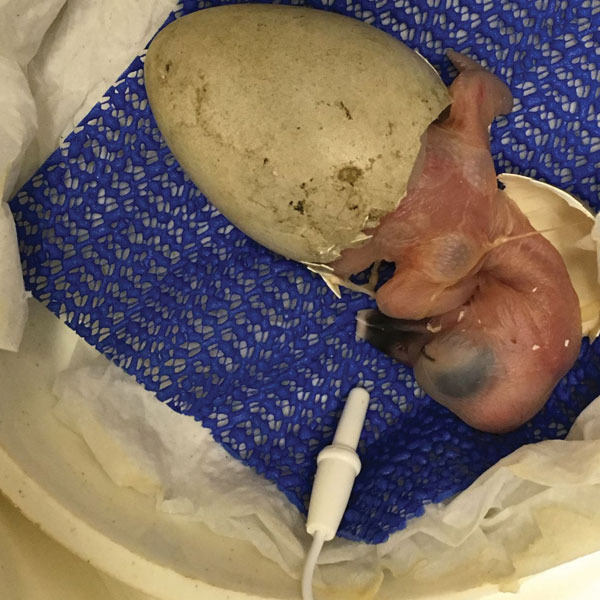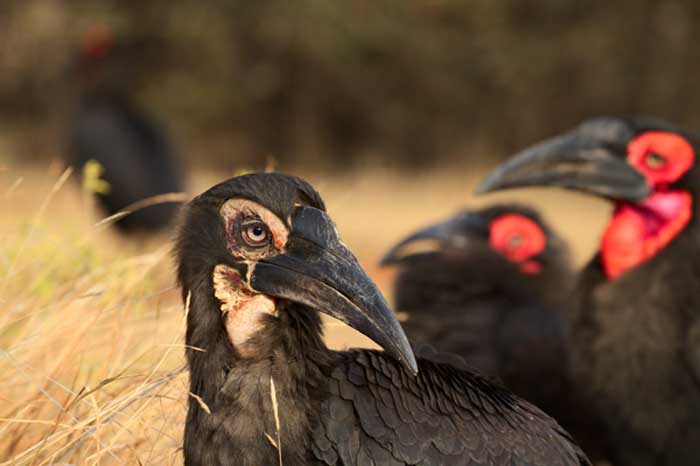Reintroductions
The most effective way to re-build the remaining wild population is to perform reintroductions of new groups into areas where the species historically occurred but is now locally extinct. Southern Ground-hornbills provide a redundant source of reintroduction stock in the form of second-hatched chicks that would otherwise perish from dehydration in the nest. This means that the chicks can be harvested from natural nests at no detriment to the wild population, so long as the first-hatched chick is healthy and can clearly be seen to be growing. Once harvested, there are several steps that the chicks must accomplish before they can be used for reintroductions:
Stage one: Hand-rearing
Once harvested, ideally within 1 - 2 days of hatching, the chicks are transported via car or plane to a specialised hand-rearing centre named "The Baobab". Here they are placed in the care of an experienced chick-rearer and housed in a brooder on the Baobab’s second-floor rearing room, which mimics the height of a natural tree nest. The brooders are positioned in the walls of the rearing room and back onto an aviary that houses a fully functional Southern Ground-hornbill group, which means that as soon as the chicks enter the rearing room they can hear and, once their eyes open, see all the sounds and behavioural cues that they would in a natural nest. As the chick grows the group then interacts with the chick, feeding it and caring for it.
Stage two: Fledging
At approximately three months of age, the young Southern Ground-hornbill chicks will be ready to fledge and the unique design of The Baobab centre, allows them to do so naturally and directly into the aviary and group that they have been socialising with throughout the rearing process. After fledging, the juvenile ground-hornbills will remain within their group for approximately a year, where after, they will have started to find their own feet, food and what being a Southern Ground-hornbill is all about. Females will remain in captivity until approximately five years old, and there is an opening for them to be reintroduced into the wild, but for the young males the process continues.

Stage three: Bush school
Once the juvenile males appear strong and confident, they are each taken to join a group called a "bush school", which is a monitored reintroduced group led by a wild alpha male. Here, the juvenile recruit is placed first into a release aviary, to allow the group to bond with their new member through the netting, and to allow the young male to become comfortable within his new surroundings. After approximately three weeks, the young male is released into the wild group and, if accepted by the alpha male, can now begin to learn all the wild survival skills from a group with many years of wild experience that are required to be a successful Southern Ground-hornbill, the most important mentor being the wild alpha male.
Stage four: Reintroduction
After approximately 3 - 4 years of wild experience, the young male, now a sub-adult, is ready to lead a group of his own and so at this point is taken to a new site and placed into a reintroduction aviary. This contains an artificial nest along with a female of similar age and a younger male helper. Here they remain for approximately 4 - 5 weeks, allowing them to bond as a new group and to reset their internal GPSs. Once the new group is suitably settled, the reintroduction can go ahead and the aviary is then dismantled, leaving the artificial nest in place to form a familiar anchor point for the group. Once the group have been reintroduced, they are monitored carefully to check on their survival, health and exploration of the new territory surrounding their nest. At this stage it is important that they find their own feet with as little further human intervention as possible. Occasionally, if an existing group has lost its alpha female, a new female may be introduced using the same basic protocols, but since alpha females will expel juvenile females from about a year after they fledge, fewer females than males are reintroduced overall.






